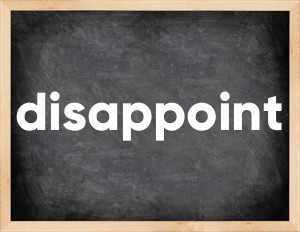 The English verb 'disappoint' is pronounced as [ˌdɪsəˈpɔɪnt].
The English verb 'disappoint' is pronounced as [ˌdɪsəˈpɔɪnt].
Related to:
regular verbs.
3 forms of verb disappoint: Infinitive (disappoint), Past Simple - (disappointed), Past Participle - (disappointed).
Here are the past tense forms of the verb disappoint
👉 Forms of verb disappoint in future and past simple and past participle.
❓ What is the past tense of disappoint.
Disappoint: Past, Present, and Participle Forms
| Base Form | Past Simple | Past Participle |
|---|---|---|
| disappoint [ˌdɪsəˈpɔɪnt] |
disappointed [dɪsəˈpɔɪntɪd] |
disappointed [dɪsəˈpɔɪntɪd] |
What are the 2nd and 3rd forms of the verb disappoint?
🎓 What are the past simple, future simple, present perfect, past perfect, and future perfect forms of the base form (infinitive) 'disappoint'?
Learn the three forms of the English verb 'disappoint'
- the first form (V1) is 'disappoint' used in present simple and future simple tenses.
- the second form (V2) is 'disappointed' used in past simple tense.
- the third form (V3) is 'disappointed' used in present perfect and past perfect tenses.
What are the past tense and past participle of disappoint?
The past tense and past participle of disappoint are: disappoint in past simple is disappointed, and past participle is disappointed.
What is the past tense of disappoint?
The past tense of the verb "disappoint" is "disappointed", and the past participle is "disappointed".
Verb Tenses
Past simple — disappoint in past simple disappointed
(V2).
Future simple — disappoint in future simple is disappoint (will + V1).
Present Perfect — disappoint in present perfect tense is
disappointed
(have/has + V3).
Past Perfect — disappoint in past perfect tense is
disappointed
(had + V3).
disappoint regular or irregular verb?
👉 Is 'disappoint' a regular or irregular verb? The verb 'disappoint' is regular verb.
Examples of Verb disappoint in Sentences
- New films continue to disappoint head office (Present Simple)
- Buying paintings disappointed our parents (Past Simple)
- He is genuinely disappointed that he cannot come with us. (Present Simple)
- He disappointed me, as did his job. (Past Simple)
- I feel very disappointed that I was not hired for this job. (Present Simple)
- Local residents were disappointed with the government's decision. (Past Simple)
- Your mom and I are very disappointed in you. (Present Simple)
- I was bitterly disappointed with this turn of events. (Past Simple)
- We have been disappointed that they hadn't gone with us. (Present Perfect)
- I am disappointed that my efforts have yielded so few results. (Present Simple)